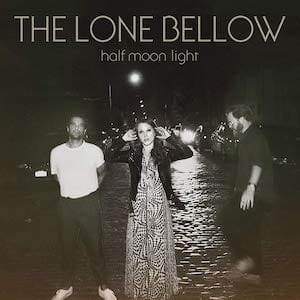 The Lone Bellow – Half Moon Light
The Lone Bellow – Half Moon Light
Eone Music – 7 February 2020
A Brooklyn trio comprising singer-guitarist Zach Williams, Kanene Donehey Pipkin on mandolin, bass, keyboards and guitarist Brian Elmquist, this is The Lone Below’s their fourth album following 2017’s Walk Into A Storm. It features 15 tracks, although three of those are brief piano instrumentals, including the intro that precedes the brass embellished I Can Feel You Dancing, which, written in memory on Zack and Brian’s grandfathers, who recently passed, is a salute to who live life with vivacity. Indeed, in an added poignant touch, all three are recordings of a hymn taken from Williams’s grandfather’s funeral played by his widow at the end of the service.
Brass and a similar sentiment inform the upbeat R&B textured and heavily percussive Good Times, a funky musical hint perhaps of Talking Heads, Williams describing it as, drawing on tales heard over the years, a celebration of those who grab life by the horns. The more reflective five-minute Wonder calms things down with its hummed and tribal drum beat intro, memories of moments of the wonderment of the world with lyrics that talk of listening to Graceland and sad country songs, riding in pick-ups taking in the moon and exploring the back roads, holding on to the sense of awe that keeps life illuminated.
Sometimes, though, you need to help of others when things weigh you down, and that’s at the heart of the tumultuous soaring Count On Me while, set to a scampering acoustic guitar rhythm, Wash It Clean is about finding reconciliation and forgiveness before it’s too late, the line “all my life I tried to let you go, would you stay” and the song itself stemming from Elmquist’s’ loss of his father, a man he’d always felt at odds with, but how, the last time they met, all the baggage had fallen away.
The theme of connections spills over into the gently rippling waves of Enemies, recalling how he and his childhood sweetheart, now his wife carved their names in a tree when they were 12 and how that memory is something that defuses tensions when arguments suggest they might have been cast more as antagonists than lovers.
A second parlour piano interlude provides a bridge into the scuffed, slurred shuffle of the blues-streaked Just Enough To Get By with its snarly electric guitar riff, the only number penned by Pipkin and written after hearing how her mother had been raped when she was 19 and given birth to a child but kept it secret for 40 years, which set her to thinking about what she’d do in similar circumstances, whether to get over it and shut up or seek personal closure.
Another percussive track, the rhythmically loping Martingales with its Paul Simon touches uses the image of the part of horse’s bridle that holds their neck in an unnaturally curved position towards the ground as a metaphor for not feeling you need things like makeup or posturing braggadocio to define your worth. Social – and political commentary – also underpins Illegal Immigrant, sung by Pipkin and written by Elmquist in response to a story of a mother and child reunited in New York after having been separated at the Mexican border, the lyric including her words “I promised I’d find you wherever you are. Here I am.”
Returning to the theme of connections, the upbeat drive of Friends again nods to David Byrne with a smidgen of Petty, in a reminder of the things we have in common that bring us together as Williams sings “I’ve got some friends that roll with punches/Can make a struggle feel like a waltz with loved ones/And help you shake your hands with demons.” Likewise, the moody part-spoken, Dust Settles, written by Pipkin’s husband Jason, who also contributes organ, is a soaring ballad about not overlooking the close relationships that surround you when, for example, you zone out because you spend so much time in each other’s company that you take it for granted and, caught up in a “fever dream” you’re “missing from the land of the living”.
Before ending with the third funeral recording Finale, featuring the voices of the grandmother’s six children, the last song, the pulsating August, consolidates the importance of friendship in a time of need. Written by Elmquist in collaboration with producer Aaron Dessner after the suicide of a close friend to depression and recalling his own despair before he became sober, it, and perhaps the album as a whole is summed up in the line “When nothing I can say will still you. A hand to hold/There is love all around you.” On what is without a doubt their best and most musically sophisticated work to date, it’s a reminder that, contrary to what the band name may suggest, we’re not howling in the dark alone.
The Lone Bellow return to the UK in May:
Photo credit: Shervin Lainez
